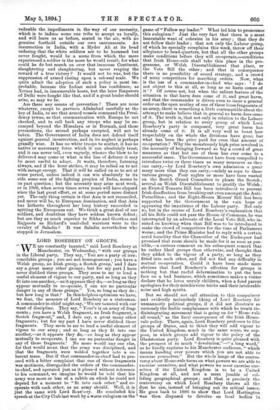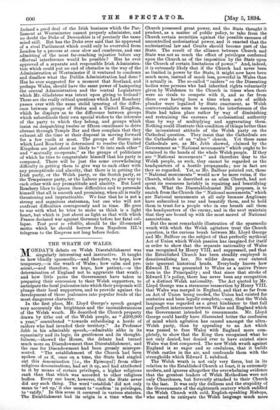LORD ROSEBERY ON GROUPS. " are constantly taunted," said Lord
Rosebery at Manchester, on Wednesday, " with our groups in the Liberal party. They say, You are a party of irre- concilable groups ; you are not homogeneous ; you have a Welsh group, an Irish group, a Scotch group,' and I dare say a great many other groups ; but for my part I have never disliked these groups. They seem to me to lend a useful element of vigour to our party, and so long as they fit into one another,—as it appears they do,—so long as they appear mutually to co-operate, I can see no particular danger in any of these groups." Yes, so long as they do ; but how long is that ? In this helpless optimism we have, we fear, the measure of Lord Rosebery as a statesman. A commander-in-chief might say,' We are taunted with our want of discipline. They say, " Your's is an army of frag- ments ; you have a Welsh fragment, an Irish fragment, a Scotch fragment," and, I dare say, a, great many other fragments ; but for my part I have never disliked these fragments. They seem to me to lend a useful element of vigour to our army ; and so long as they fit into one another,—as it appears they do,—so long as they appear mutually to co-operate, I can see no particular danger in any of these fragments.' No more would any one else, for that would mean that the army was disciplined, and that the fragments were welded together into a co- herent mass. But if that commander-in-chief had to pro- ceed with a bitter complaint that one of these fragments was mutinous, disregarded the orders of the commander- in-chief, and operated just as it pleased without reference to his command, we imagine he would be told that his army was more or less of a rabble on which he could not depend for a moment to " fit into each other," and co- operate with each other, as an army should. Well, it is just the same with Lord Rosebery. He concluded his speech at the City Club last week by a warm eulogium on the game of " Follow my leader." What led him to pronounce this euloginm ? Just the very fact that there is a moat lamentable want of cohesion in his army ; that they do not follow their leader ; that not only the Labour group, of which he specially complains this week, throw off their allegiance to head-quarters, but that all the other groups make conditions before they will co-operate,—conditions that Irish Home-rule shall take this place in the pro- gramme, or Welsh Disestablishment that place, or the Veto Bill the other ; and that in consequence there is no possibility of sound strategy, and a crowd of noisy competitors for marching orders. Now, what is the use of a commander-in-chief who says : I do not object to this at all, so long as no harm comes of it' ? Of course not, but when the salient feature of the situation is that harm does come of it, and great harm, and that the commander is driven even to issue a, general order on the open mutiny of one of these loose fragments of an army, there is something a little contemptible about the attempt to make believe that in general no harm does come of it. The truth is, that not only in relation to the Labour group, but in relation to every group of which Lord Rosebery's party is composed, very great harm has already come of it. It is all very well to boast how respectably on the whole the divisions have gone, but what has been the price paid for even that amount of co-operation ? Why the monstrously high price involved in the necessity of bringing forward so big a crowd of great measures as that but one of them has ever come to a successful issue. The Government have been compelled to introduce twice or three times as many measures as they can carry,—by Lord Rosebery's own admission a great many more than they can carry,—solely as sops to these various groups. Four nights or more have been wasted on the Scotch Grand Committee to please the Scotch ; several on Welsh Disestablishment to gratify the Welsh ; an Evicted Tenants Bill has been introduced to prevent Irish disaffection from breaking out even amongst the Anti- Parnellites ; and the Eight-Hours Miners' Bill has been supported by the Government in the vain hope of appeasing the impatience of the Labour party. Not only so, but in the course of Lord Rosebery's explanation that all his Bills could not pass the House of Commons, he was interrupted by an advocate of the Local Veto Bill, who in- sisted on knowing when that Bill was to be introduced to make the crowd of competitors for the time of Parliament worse ; and the Prime Minister had to reply with a certain acrid humility that the Chancellor of the Exchequer had promised that room should be made for it as soon as pos- sible,—a curious comment on his subsequent remark that he rather liked groups than otherwise, and thought that they added to the vigour of a party, so long as they fitted into each other, and did not find any difficulty in mutual co-operation. Could it have been made more obvious that Lord Rosebery's affection for groups is nothing but that rueful determination to put the best face on a bad business, which sometimes makes a visitor declare that he loves unruly children, when a fond parent apologises for their mischievous tricks and their intolerable noise and high spirits.
But we should not call attention to this compulsory and evidently melancholy liking of Lori Rosebery for unmannerly political groups, if it did not illustrate so curiously the feeble complaisance with which he treats the disintegrating movement that is going on for "Home rule all round," as the fatal consequence of the Irish Home- rule policy. There, again, Lord Rosebery professes to like groups of States, and to think they will add vigour to the United Kingdom, much in the same sense, we sup- pose, in which groups add vigour to the policy of the Gla.dstonian party. Lord Rosebery is quite pleased with the prospect of so much "devolution,"—" a. long word," as he kindly explains to his Manchester audience, " which means handing over powers which you are not able to exercise yourselves." But the whsle hinge of the contro- versy about Home-rule turns on what powers we are able to exercise ourselves, and what powers we must exercise our- selves if the' United Kingdom is to be a United Kingdom at all, and not a mere jumble of col- liding geographical groups ; and that is precisely the controversy on which Lord Rosebery throws all the dust he can, instead of bringing out its critical issues. He goes back to 1886 to show that Lord Hartington was then disposed to devolve on local bodies in Ireland a good deal of the Irish business which the Par- liament at Westminster cannot properly administer, and no doubt the Duke of Devonshire is of precisely the same mind still. But has the Duke ever said that he approved of a rival Parliament which could only be overruled from London by a process at once slow and cumbrous, and one admitting of the most far-reaching injustice before any effectual interference would be possible ? Has he ever approved of a separate and responsible Irish Administra- tion which could put no end of obstacles in the way of the Administration at Westminster if it ventured to condemn and disallow what the Dublin Administration had done ? Has he ever suggested for a moment that Scotland, and perhaps Wales, should have the same power of hampering the central Administration and the central Legislature which Mr. .Gladstone was intent upon giving to Ireland ? These are the really critical questions which Lord Rosebery passes over with the same stolid ignoring of the differ- ence between groups of States and a United Kingdom, which he displays as to the difference between groups which subordinate their own special wishes to the interests of the party to which they belong, and groups which insist on despatching twelve or fifteen omnibuses to drive abreast through Temple Bar and then complain that they exhaust all the time at their disposal in moving forward for a few yards at most. The groups of States into which Lord Rosebery is determined to resolve the United Kingdom are just about as likely to " fit into each other " and " mutually co-operate," as the groups of politicians of which he tries to congratulate himself that his party is composed. There will be just the same overwhelming difficulty in getting them to give way to each other with any promptitude and alacrity, that there is in getting the Irish party, or the Welsh party, or the Scotch party, or the Temperance party, or the Labour party, to give way to each other with any promptitude and alacrity. But Lord Rosebery likes to ignore these difficulties and to persuade himself that all is smooth and promising, when all is really threatening and impracticable. We fear that he is not a strong and sagacious statesman, but one who will not confront difficulties courageously and in time. He goes to war with what he tries to make us think is a light heart, but which is just about as light as that with which France declared war against Germany before her fatal col- lapse. Tout pent se retablir, should be the ill-omened motto which he should borrow from Napoleon III.'s telegram to the Empress not long before Sedan.







































 Previous page
Previous page